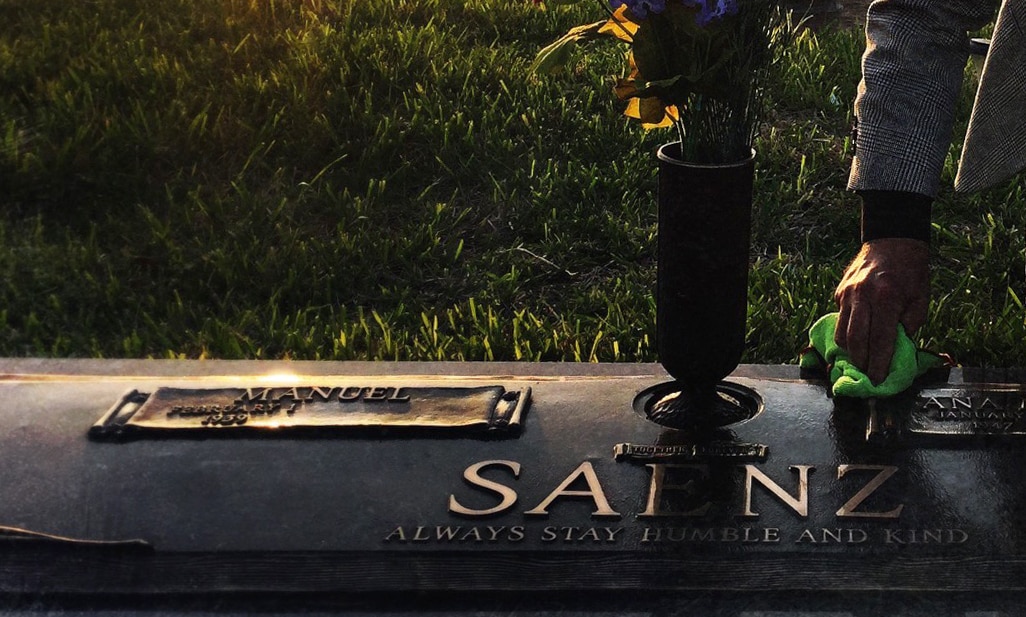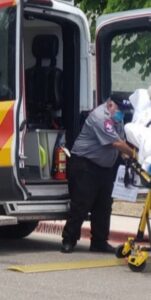MISSION — The last time Manny Saenz Jr. remembers being with his father, close enough to touch him, was March 9, 2020, a year and five days ago.
The last time Manny Jr. saw his father was a couple of months later.
Manny Sr. of San Isidro was being taken out of the back of an ambulance in the parking lot of an Edinburg hospital during the height of the COVID-19 pandemic in the Rio Grande Valley.
For an 81-year-old, Manny Sr. was as strong as an ox. His cardiologist had joked last winter that he may as well flip his age around. Manny Sr. agreed, evidently. He did just that at his birthday party at Pappadeaux Seafood Kitchen in February last year, calling off the picture-taking until he could reverse the candles stuck in the cake.
No one would compare Manny Sr. to an 18-year-old by then. He looked frail and was bundled in blankets, brow furrowed and strapped down into the gurney.
Manny Jr. snapped a picture while they wheeled his father out of the ambulance, standing a couple dozen yards off. He figured he’d show it to his dad when he recovered. They’d laugh about it, about how crazy it had been.
He never got the chance. Manny Sr. died in the back of another ambulance a couple of weeks later, alone, save for the company of paramedics he didn’t know and the hundreds of COVID-19 fatalities he was about to join.
Because of his age, Manny Sr. is typical of those tragedies. Older people, vulnerable people, people with underlying conditions. Manny Sr. was the demographic one would expect to die in the pandemic.
A whole family succumbing to the virus, or a particularly young fatality, stood out among those tragedies and would make headlines.

Manny Saenz Sr.’s death was typical. The Valley has seen thousands like it in the last year, people that were expected to die, and did die, by the ones and twos and by some days and by scores on others.
And yet, there’s nothing typical in the tragedy of Many Saenz’s death or in the tragedy the Rio Grande Valley has coped with for a year now.
Manny Sr. was a big man with a big personality. Tall and athletic in his youth, he played baseball for what is now UTRGV in college. He shared that passion for sports in San Isidro, where he worked for 30 years as a coach and math teacher.
Selfless and kind, Manny Jr. remembers his father as the kind of man who put others’ success before his own, who shined when they shined. The kind of man who was level headed and sturdy as an oak.
“There’s a Spanish saying that his father used to say. In Spanish it’s, ‘Es mejor que hay un sonso y no dos.’ It’s better if there’s one crazy man and not two,” he said. “The message there is cooler minds prevail. You’ve gotta be the smart one, even if it’s not popular.”
Manny Sr. was a fixture in San Isidro. He was a car lover and an amateur mechanic, although the community saw him as enough of a professional to bring their rides by when they weren’t running right. The Mannys would get them running again, Manny Sr. teaching Manny Jr. how to replace alternators and radiators, making a lesson out of the hobby.
Just before the pandemic arrived, Manny Jr. took him to a car show in McAllen. His dad was practically a celebrity. People came up, gushing over how nice it was to see him. Manny Sr. drank it up like a kid in a candy store.
That sort of reaction wasn’t anything out of the ordinary. People have been stopping Manny Jr. out in public for years to sing his dad’s praises.
“They’ll just tell me, ‘Your dad changed my life. I just want you to know that.’ I can’t even tell you how many times I would get that from people — of course I didn’t know them,” he said. “Some of these former students, former athletes were much older than me.”
Manny Jr. and his father had gotten particularly close in the year before the pandemic. Ana Maria, Manny Sr.’s wife, died after an accident in 2019. Manny Sr. moved into an assisted living facility in Edinburg, closer to his son, and Manny Jr. capitalized on that. He didn’t have to drive all the way out to San Isidro to see his dad anymore and didn’t have any excuses not to.

Manny Jr. visited most every evening, chatting about politics and sports and the weather. Many nights, he would tuck his father into bed before he went to sleep.
Manny Sr. flourished there. He loved the attention and before long he loved the assisted living facility. He took up art, learning how to paint sailboats and birds and old timey waggons.
Manny Sr. would be upset if the facility skipped a painting class for a week, and he’d good-naturedly chastise his son, the fine arts director at Edinburg North High School, for not painting as much anymore.
Manny Sr. knew life was short and he wanted to make the most out of it.
“I think the best year of my life as a son, in regards to the quality of my relationship with my father, was the last year of his life,” Manny Jr. said. “Having him here.”
Last March, the Saenzes’ conversations started to include the coronavirus. Manny Sr. read about the pandemic getting worse in the news and he was worried about his facility being locked down. He wasn’t sure how he would deal with it.
A year ago, Manny Sr.’s facility was locked down. Manny Jr. kept coming by, calling his father and talking to him while they looked at each other through the window. They’d talk, Manny Sr. sitting on the edge of his bed and Manny Jr. just outside, sometimes for hours. Sometimes in the rain, Manny Jr. huddled under an umbrella.
Still, Manny Jr. saw the isolation weigh on his dad.
“That really crushed him,” he said. “He was really, really saddened about that. It’s amazing what a human touch, how much that meant to him. A pat on the back, a kiss on the cheek. A hug.”
A few months into the pandemic, Manny Sr.’s family received a robocall from a rehabilitation facility he was at briefly letting them know an employee there had tested positive for COVID-19. The family didn’t think much of it until Manny Sr. tested positive for the virus a couple of days later.
That would be the end of Manny Sr.’s love of old cars and of his fondness for painting. It was the end of hours of evening chats with his son about sports and politics and the weather. It was the day that 1 and 8 in his age stopped being reversible.
Manny Sr. was 81 for good now.
‘I WASN’T READY TO SAY GOODBYE’
The first week he was sick, he was asymptomatic and did alright. The next week he started to falter and he was hospitalized.
Manny Jr. and the family were scared. They’d heard the all too true horror stories of refrigerated trucks and swamped hospitals.
Nurses and doctors tried to keep the family in the loop while Manny Sr. faded, but sometimes it would take days for someone at the hospital to even answer the phone. Window visits were out of the question, Manny Sr. was in a room a few stories up. On the occasions the nurses caught Manny Sr. awake and coherent enough for a phone call, he was quiet, distant.
“That was hard to bear,” Manny Jr. said. “Because it wasn’t him.”
One day Manny Jr. says the family got a call from the hospital, who told them his father needed to be moved to a rehabilitation center. The hospital needed the bed for someone with a fighting chance, he remembers them saying.
“We were told basically that we needed to get him out of the hospital, and that was tough too,” he said. “Because in our minds, we’re thinking he’s in the place he should be, because he’s very sick and he needs all the care he can get.”
The family made the best out of it. They found a rehab facility that was accepting COVID-19 patients, and it was one-story. Manny would be able to look at his father through the window again, at least. The family decided they would set up camp in the parking lot.
They never got the chance. Manny Sr. died in an ambulance on July 15.
“I wasn’t ready to say goodbye,” Manny Jr. said. “The way it ended — it was just brutal. It was a brutal ending. It was very stressful on us, and I know it was so tough on him. He was alone. He spent the last month and a half alone. And that’s just the truth of the matter.”
The family was told it would take two or three weeks to bury his father. The funeral homes were overwhelmed by the amount of bodies they had to process.
When they finally could bury Manny Sr., there were only about 10 people at the surface, shrouded in plexiglass and PPE. They didn’t hug.
It was bizarre, Manny Jr. says, and painful.
“He knew so many people,” he said. “He probably could have had hundreds and hundreds of people who wanted to come down to pay their last respects.”
It’s been a year since Manny Sr. told his son he was worried about the pandemic, a little over half a year since he was buried.
Manny Jr. paints more, now, his father’s criticism and that ‘life is short’ mentality sinking home. He has an extra hour or two every evening now, a gap in his schedule left by the absence of his father. He channels that time into his wife and daughter.
Manny Jr. still visits his father, at his gravesite in Mission — one of over 2,000 graves in Hidalgo County that exist because of the pandemic.
Manny will usually go on a Sunday. He’ll polish his father’s tombstone, and if his wife and daughter come, he’ll reflect or talk with them.

If Manny comes alone, he’ll talk to his dad.
“You’ll think I’m crazy, but it’s almost like he’s there,” he said. “I’ll kind of fill him in on what’s going on in life. Tell him I love him. Say a little prayer. And tell him I’ll see him next time.”
Manny Jr. still has that picture of his father being loaded into an ambulance from last year, the one he figured he and his dad would laugh about one day. He talks about it like he’ll delete it, maybe like he should delete it.
And yet, he can’t quite do it.
“Even though it’s just that one picture, it’s him,” he said. “And I just don’t want to delete him.”




